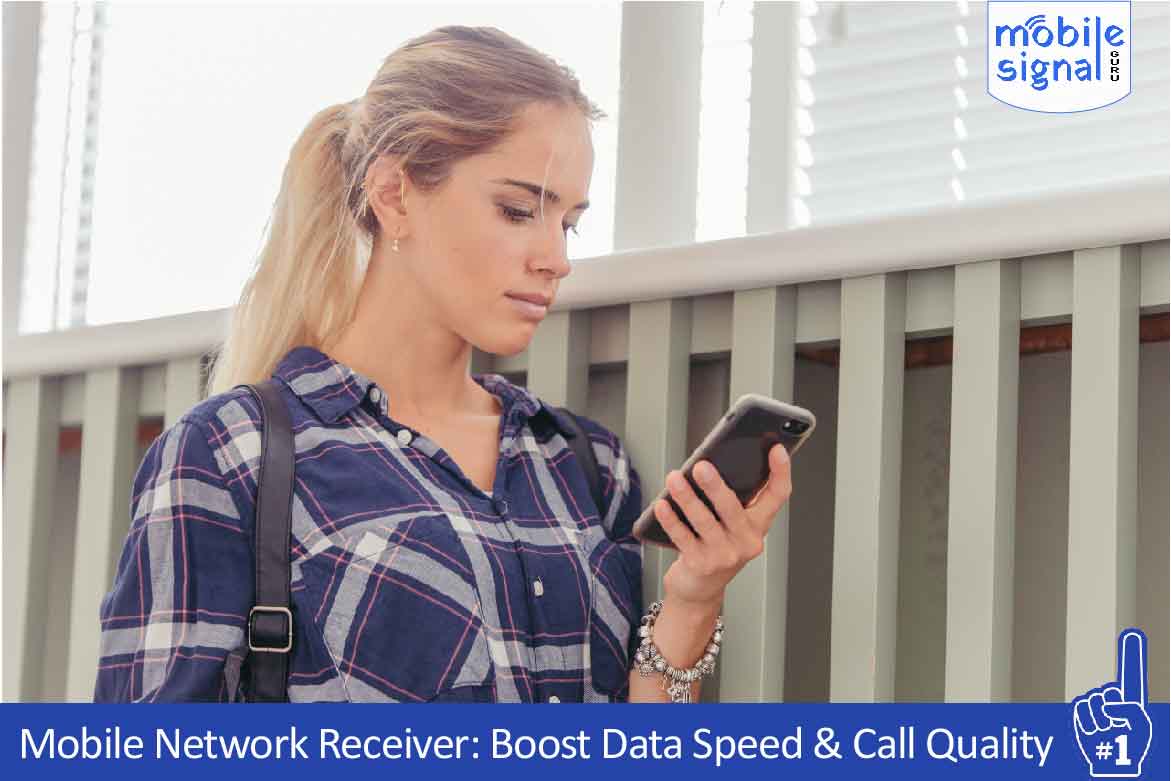Mobile phones have become an essential part of our lives. They help us communicate, stay connected to the world, and access the internet anytime, anywhere. However, poor mobile signal reception can disrupt this connection, making it hard to make calls or browse the web. This is where mobile network receiver also known as mobile signal booster come into play. They are designed to improve the quality of mobile calls and boost data speeds, making communication smoother and more reliable.
In this article, we will explore how mobile network receivers / mobile signal boosters work to enhance mobile call quality and data speed. Whether you’re in a remote area, a building with thick walls, or facing weak signal coverage, signal boosters can make a big difference. Let’s dive in.
What is a Mobile Network Receiver?
A mobile network receiver is a device that receives and amplifies signals from nearby cell towers. It helps improve the quality of your mobile connection, ensuring that you can make calls and use the internet without interruptions. The mobile network receiver works with mobile signal boosters to enhance weak signals, making them stronger and more stable.
Signal boosters consist of three main components:
- External Antenna: This antenna receives the weak signal from nearby cell towers.
- Signal Booster: It amplifies the signal received by the external antenna.
- Internal Antenna: This antenna distributes the boosted signal to your phone, improving your mobile connection.
When your mobile device connects to a signal booster, the mobile network receiver ensures that the call quality and data speed are enhanced.
Why Do You Need a Mobile Network Receiver?
In certain situations, you may experience weak mobile signals. This can happen in places with poor coverage, such as rural areas, underground locations, or buildings with thick walls. The following factors contribute to poor mobile signals:
- Distance from the Cell Tower: The farther you are from the nearest tower, the weaker the signal will be.
- Obstructions: Thick walls, metal structures, or large buildings can block signals.
- Geographic Location: Hilly or mountainous areas may have weak signal coverage.
- Network Congestion: In busy areas with many users, the network may become overloaded, leading to dropped calls and slow data speeds.
In these cases, a mobile network receiver becomes essential. It helps ensure a strong connection, even when you’re far from a cell tower or in an area with weak coverage.
How Do Mobile Signal Boosters Work?
A mobile signal booster works by amplifying weak mobile signals. Here’s a breakdown of how they operate:
- Signal Reception: The external antenna installed outside your home or vehicle picks up weak signals from nearby cell towers. This antenna is placed in an area with the best available signal.
- Signal Amplification: The signal booster amplifies the weak signal. The stronger the signal, the clearer the call quality and faster the internet speed.
- Signal Distribution: The internal antenna distributes the amplified signal inside your home, office, or vehicle, improving your mobile reception.
By boosting the signal strength, the mobile signal booster ensures that your mobile phone receives better call quality and faster data speeds.
Benefits of Using a Mobile Signal Booster
Using a mobile signal booster can significantly improve your mobile experience. Below are some key benefits of having a signal booster:
1. Improved Call Quality
One of the main reasons people use signal boosters is to improve call quality. Weak signals often cause dropped calls, poor voice clarity, or audio distortion. By amplifying the signal, a mobile signal booster ensures that your calls are clear and uninterrupted.
2. Faster Data Speeds
Slow internet speeds can be frustrating, especially when you need to stream videos, browse the web, or use data-heavy apps. A mobile signal booster helps to increase data speeds by amplifying weak signals, allowing you to enjoy faster internet connectivity.
3. Enhanced Coverage in Remote Areas
If you live in a remote area or travel frequently to places with poor network coverage, a mobile signal booster can make a huge difference. The booster extends coverage to areas where signals would otherwise be weak or nonexistent.
4. Better Performance in Buildings
Thick walls, concrete structures, or basements often block mobile signals. Signal boosters improve reception inside buildings by amplifying the signal and distributing it throughout your home or office. This ensures better coverage and stronger signals in all areas of the building.
5. Reduced Dropped Calls
Dropped calls can be frustrating, especially when you’re in the middle of an important conversation. By boosting your signal, mobile signal boosters reduce the chances of call dropouts, ensuring your conversations are stable and uninterrupted.
6. No Need for Wi-Fi Calling
In areas with poor cellular coverage, people often rely on Wi-Fi calling to make and receive calls. However, Wi-Fi networks may not always be reliable. Signal boosters eliminate the need for Wi-Fi calling, providing a stable mobile network connection instead.
7. Increased Battery Life
When your phone is trying to find a signal, it works harder, which drains the battery faster. With a mobile signal booster, your phone receives a stronger signal, which helps conserve battery life by reducing the phone’s effort to search for a connection.
Types of Mobile Signal Boosters
Mobile signal boosters come in different types based on the area they cover and the type of mobile network they support. Let’s take a look at the most common types:
1. Home Signal Boosters
Home signal boosters are designed for residential use. They cover a specific area in your home, ensuring better call quality and faster data speeds. These boosters typically include an external antenna, a signal amplifier, and an internal antenna.
2. Vehicle Signal Boosters
If you spend a lot of time in your car, a vehicle signal booster can help you maintain a strong connection while on the road. These boosters are designed to improve mobile signal reception in cars, trucks, and RVs. They are especially useful for long road trips or areas with weak coverage.
3. Office Signal Boosters
Businesses in areas with poor mobile signal reception can benefit from office signal boosters. These boosters are designed to enhance signal quality and improve connectivity in offices, warehouses, or other commercial spaces.
4. Portable Signal Boosters
Portable signal boosters are small, compact devices that can be carried around. They are ideal for people who travel frequently or need a mobile signal boost while on the go. These devices are easy to set up and can be used in cars, hotels, or temporary locations.
5. Cellular Signal Boosters for Large Areas
For larger buildings or commercial spaces, cellular signal boosters are available to cover wider areas. These boosters are capable of enhancing signals in multiple rooms, ensuring consistent coverage throughout large spaces.
How to Choose the Right Mobile Network Receiver?
Choosing the right mobile network receiver depends on several factors. Here are some key things to consider before purchasing a signal booster:
1. Area of Coverage
Consider the size of the area where you want to improve the signal. Choose a booster that matches the size of your home, office, or vehicle. Larger spaces may require more powerful boosters.
2. Network Compatibility
Check if the signal booster supports the network bands used by your mobile carrier. Some boosters work with specific carriers or frequencies, so it’s important to choose one that is compatible with your provider’s network.
3. Type of Building or Location
Consider whether the signal booster will be used in a home, vehicle, office, or large commercial space. Each setting may require a different type of booster to maximize effectiveness.
4. Signal Strength
Evaluate the current signal strength in your area. If the signal is extremely weak, you may need a more powerful booster to achieve noticeable improvements.
5. Ease of Installation
Look for a signal booster that is easy to install and use. Some boosters require professional installation, while our signal boosters are simple enough to set up on your own.
Conclusion
A mobile network receiver and signal booster can drastically improve your mobile phone’s performance. Whether you need better call quality, faster data speeds, or extended coverage in areas with weak signals, a signal booster is an effective solution. It ensures clear communication, fast internet, and a more reliable mobile experience, whether at home, in the office, or on the go.
Investing in a mobile signal booster can save you from the frustration of poor connectivity. It provides a cost-effective way to enhance your mobile experience and stay connected no matter where you are. By choosing the right booster for your needs, you can enjoy crystal-clear calls and lightning-fast internet speeds.
In today’s connected world, reliable mobile signal reception is essential. A mobile network receiver combined with a signal booster will help ensure that your mobile calls and data are always strong and consistent. So, if you’re struggling with weak mobile signals, consider installing a mobile signal booster to enjoy the benefits of improved call quality and faster data speeds.
 Australia (AUD)
Australia (AUD) Denmark (DKK)
Denmark (DKK) France (EUR)
France (EUR) Germany (EUR)
Germany (EUR) Ireland (EUR)
Ireland (EUR) Malta (EUR)
Malta (EUR) Netherlands (EUR)
Netherlands (EUR) New Zealand (NZD)
New Zealand (NZD) Norway (NOK)
Norway (NOK) Spain (EUR)
Spain (EUR) Sweden (SEK)
Sweden (SEK) UAE (AED)
UAE (AED) United Kingdom (GBP)
United Kingdom (GBP)
